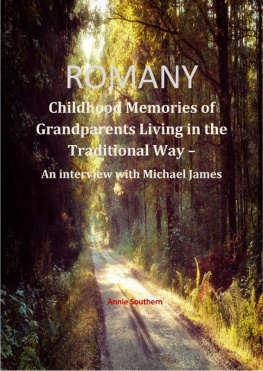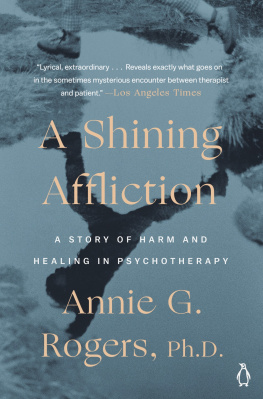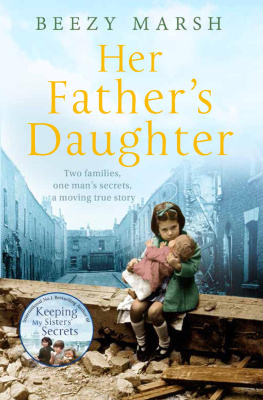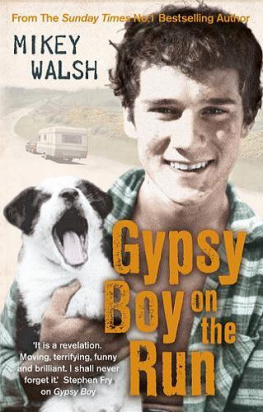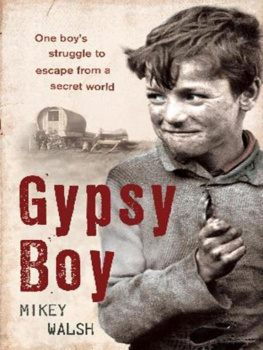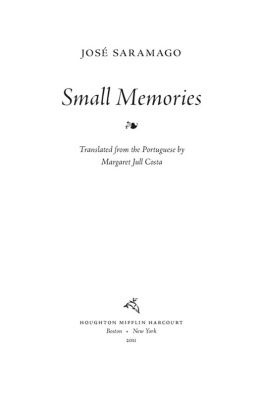Cover &book design Annie Southern
Annie Southern 2020
No part of this publication maybe reproduced, stored in a retrieval system or transmitted in anyform or by any means, electronic, mechanical, photocopying,recording, scanning or otherwise without the permission of thecopyright owner.
Cover picturesourced from Unsplash
Typesetting Anna van denBosch
Pictures Lukasz Szmigiel (cover), Michael & JennyJames (interior)
ISBN 9780463334225
Publishedby Smashwords
With love andthanks to Mike & Jenny James
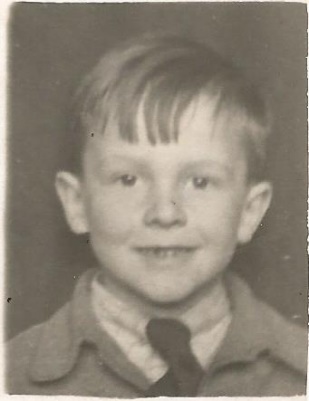
ANNIE: Tell me a little aboutyourself.
MIKE: My name is MichaelJohn James; I was born on the 26 th of September in 1940, in Evesham,Worcestershire, in England. This is a photo of me as aboy.
ANNIE: Tell me about yourchildhood, because you had grandparents who still lived in thetraditional Romany horse drawn wagon, Romany being the correct termfor the people who are commonly called gyspies.
MIKE: When I was a child, theywere always granny and grandad and they lived on a fruit farm andthat was it. I accepted them for who they were and, yeah, they weredifferent. As I was growing up, I never imagined anythingdifferent; they were just the way they were.
ANNIE: What is your firstmemory of your grandparents?
MIKE: I remember them from whenI was about three or four years of age. They lived at a fruit farmabout three miles away. They were living in their Reading wagon.Mum used to take me to see them. I remember being in a pushchairand going down a hill and up another hill and then there it was their wagon was in an orchard.
ANNIE: Why did they move to thefruit farm?
MIKE: It was secure work. Hewas a hawker, a licenced hawker, granddad was. In 1911, the censussays that grandad was a hawker of cabinet furniture. Thats thesame profession as his father-in-law Isaac Marshall who was giventhe occupation of cabinet furniture hawker in the census too. Nowhaving said that, thats what was written in the census. I dontknow what sort of cabinet furniture they would be making. I knowthere was a lot of basket making and I do remember grandad makingsome baskets. Granny used to make pegs. So Im sure in the pastthats what they did. However, it says cabinet furniture. So Imnot too sure what that is.
Hawking and seasonal work hadtaken the Jameses around Herefordshire, Worcestershire, Oxfordshireand down as far as Wiltshire for several generations before mygrandparents settled. What I know of that travelling history isthat a Romany family called the James my family had travelled alot with another Romany family in the 1800s called the Scarretts.My wife and I found a record of them camped at a common, with theirwagons the Scarretts and the Jameses in the 1860s.
Records show that mygrandfathers father and two of the Scarretts got caught onChristmas Day would you believe taking hay from a field orpaddock. We presume it was to feed the horses. They got caught andthey were brought up before the magistrate. We dont know whathappened but for some unknown reason the two Scarretts got let off,but my grandfathers father got sent down for six months. Weve gothis prison record. In those days when you got six months you servedsix months, not like today where you get 10 years and you come outafter five. His conduct while he was in jail was exemplary. Fromthe time he came out of jail, we can find no trace of the Jameseshaving any association with the Scarretts again. So I think theysold him down the river. I think they probably ganged together.
The Jameses travelled on theirown after that until they teamed up with the Marshalls. The Jamesesand the Marshalls travelled around doing seasonal work or hawkingtogether and that continued for quite some time. Eventually mygrandfather, Ishmael James, married Selena Marshall, my grandmotherin 1915. Thats how they got to know each other, through thistravelling. They were first cousins because the Jameses and theMarshalls had inter-married before. The Selena my grandfathermarried was Selena Marshall. She was the niece of Selena James, mygrandfather Ishamel James mother.
My grandparents settled downsoon after marriage and worked and lived on a fruit farm. The RiverAvon ran through Evesham. They were across the river in an orchardjust out of a small village three miles outside Evesham. I neversaw any visitors when I visited them. I think few Romany peoplevisited because they probably disapproved of them settlingdown.
ANNIE: Did they have anyrelatives living in the area?
MIKE: There was never anybody,as far as I know no body close at hand. I never saw anybody. Mymum and dad dad especially never talked of other members of thefamily. Weve subsequently found that my grandfather Ishmael had asister called Lilo who lived in Pershore, but that was only throughfamily research.
Of course, what you have torealise is that we never had a car in the 1940s and 1950s as I wasgrowing up. Dad was a builders labourer so it was beyond hismeans. The four of us my brother, myself, mother and dad usedto get on our four bicycles and we used to cycle out to granny andgrandads. On a bicycle it used to take half an hour there and halfan hour back home. However, visiting someone living in Pershorelike grandads sister Lilo? No, we never went visiting, because howdid you get there? You couldnt say, Well, Ill pop over and seethem and come back. Today we do. We get in the car and we go andthe distance is nothing, but back then it was.
ANNIE: How many children didyour grandparents have?
MIKE: Granny and grandad Jameshad three sons and a daughter Harry, Ishmael, my dad Jack andFanny. Ishmael was born in 1912. They got married in 1915.
ANNIE: Did they have thechildren before they got married?
MIKE: Yes. They had three ofthem. Fanny, Henry and Ishmael. Then my father was born in 1919after they were married. Of course, Romanies didnt necessarily gothrough a civil registration to get married and they didnt go to achurch to get married. It was just assumed. There are the oldstories about jumping over the fire and all that sort of thing.
So theyd had threechildren and then all of a sudden they got married. I believe theyonly got married because grandad was going off to the First WorldWar. He went into the army on the27 th of June 1916. He actuallywent into an infantry regiment, and, part way through the war, thearmy decided to form a new corps and to call it the Machine GunCorps. I cant remember whether they called for volunteers from allthe different regiments, or whether they actually seconded peopleout of that regiment into this particular new Machine Gun Corps.Anyway, Grandad was in the Machine Gun Corps.
During the time he was offfighting in the First World War, his wife Selena and the childrenlived at Callows Cottage, Bishops Frome.
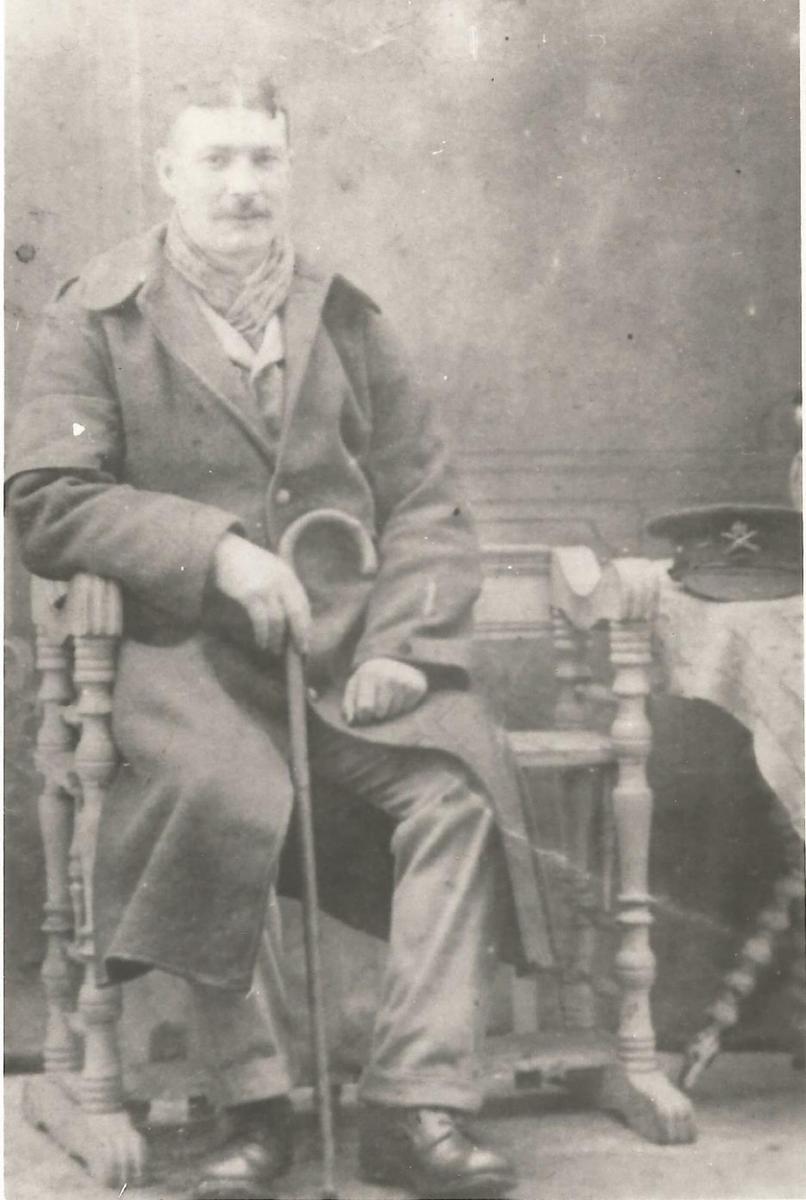
He was injured and he wasdischarged because of injury in July 1918. This photo shows himwith a walking stick, probably due to convalescing from his injury.He got a Silver War Badge. It was issued to all soldiers who weredischarged because of ill health or being wounded, because in thosedays, during the war, if an able-bodied man was seen to be walkingaround he was given a white feather, because conscientiousobjectors were frowned upon. So you needed to wear your badge sothat you could wear it with pride because youd been injured whilefighting for your country.
He got hit with shrapnel. Hedidnt get a direct shot. They must have dropped a bomb or a mortarbehind him because it was in his rear end. He got wounded in thebum. I saw it. He showed me once. It was quite a nasty scar. Inlater life, when I thought about it, I thought well, surely, theywould just stitch him up and send him back into the front line, buthe got his discharge. The Machine Gun Corps were all demobbed in1919 and he must have lived in Bishops Frome for a time in thecottage because there is a picture of my father as a baby outsidethe cottage there with all the others and he was born in 1919 aftermy grandfather got home.
Next page
